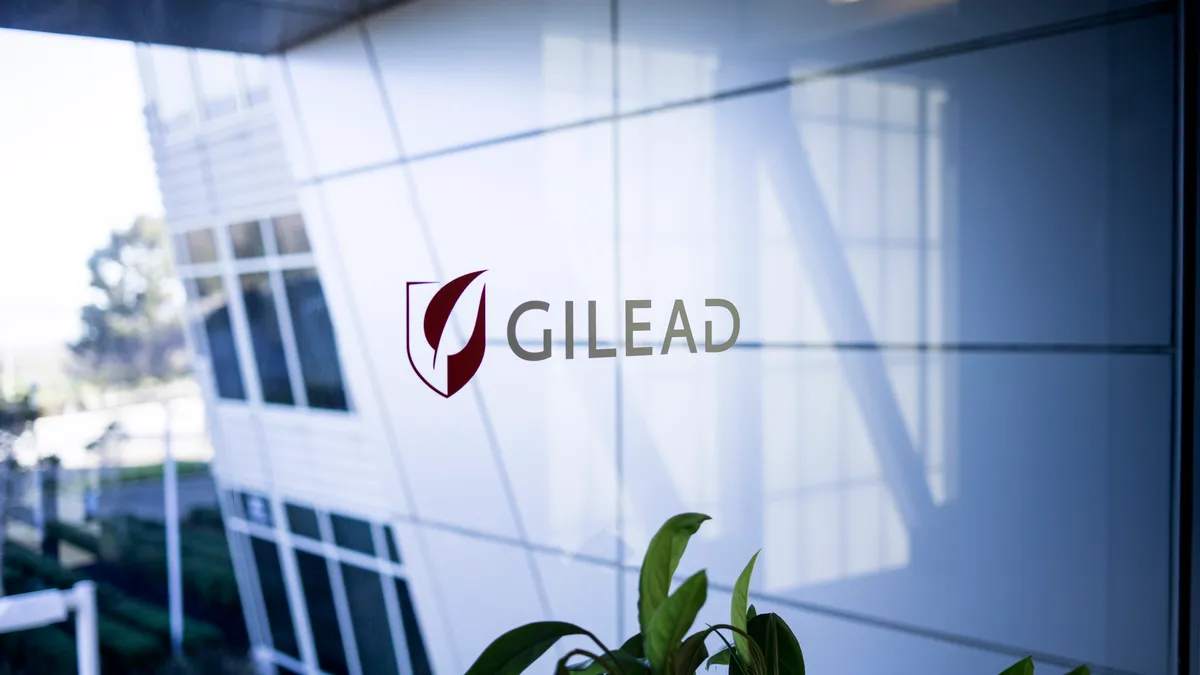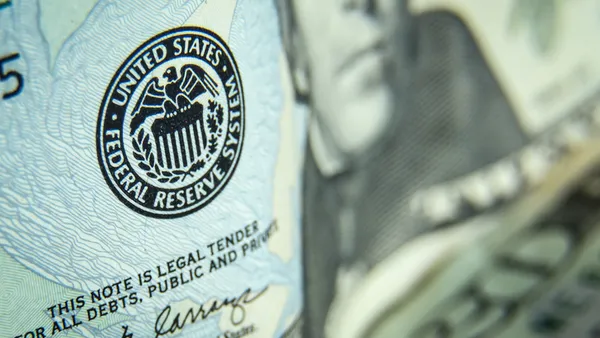Gilead made a business out of fighting viruses. The California drug company's effective, often expensive medicines changed how diseases like HIV and hepatitis C are treated, and, in doing so, made it one of the world's wealthiest biotechs.
But Gilead hasn't found as much success in cancer research. For several years, it's tried to become an oncology powerhouse, only to see its efforts fail to take off. In the meantime, sales of several of its top drugs have been in free fall, putting pressure on the company and its cancer division to come through.
This year, Gilead tried a different approach. Under a new leadership team, the company inked more than half a dozen deals that provide access to a slate of experimental cancer drugs and a marketed therapy for breast tumors. At a combined value of more than $27 billion, the deals are Gilead's most substantial push yet to transform into a cancer treatment leader.
"Gilead had a very clear ambition to move into oncology," Andrew Dickinson, the company's CFO, told BioPharma Dive. "And what you saw in 2020 was really a culmination of that work."
The buildup
For most of its 33-year run, Gilead wasn't a big dealmaker. There were a few defining acquisitions — the 2003 purchase of Triangle Pharmaceuticals, which bolstered Gilead's position in HIV treatment, and the 2011 takeover of Pharmasset, which handed Gilead a soon-to-be megablockbuster drug for hepatitis C.
But by 2016, attitudes were changing. The company's hepatitis C business had peaked, and a staggering sales drop was fast approaching. Gilead needed new drugs, and dealmaking was one of the quicker ways to get them.
Dickinson joined the company that year, assuming the role of senior vice president of corporate development after nearly a decade in the investment banking unit at Lazard, where he advised large biotechs such as Celgene and Amgen. He said there was a "very clear mandate" from then-CEO John Mulligan to reinvent Gilead's business development strategy.
"We started meeting with venture capitalists," Dickinson said. "We started taking our research team and flying to the east coast of Europe and San Diego, even around our hometown, traveling and meeting companies — which, again, Gilead hadn't done that much."
Gilead had dabbled in smaller biotech deals before, most notably the 2011 buyout of Calistoga Pharmaceuticals and its lymphoma drug, Zydelig, which the company hoped would jumpstart an oncology business.
In 2017, Gilead made its most significant investment in cancer drugs with the $12 billion acquisition of Kite Pharma, which launched the company to the front of an emerging field of research focused on engineering immune cells to better fight cancer. Kite, however, was a long-term investment, and did little to resolve Gilead's immediate problems.
Soon after Kite, changes had come to more than just the deals team.
Many of Gilead's top executives were replaced throughout 2019. Daniel O'Day, the former head of pharmaceuticals at Roche, came on as CEO in March. In the months that followed, Gilead appointed a new chief medical officer, Merdad Parsey; a new chief commercial officer, Johanna Mercier; and a CEO for Kite, Christi Shaw. Dickinson rounded out the list, moving into the CFO role last October.
The appointments set the stage for Gilead's reinvigorated push into cancer. O'Day, Parsey, Mercier and Shaw had each worked at top oncology companies, and brought with them experience developing, selling and managing cancer drugs that Gilead didn't have before.
"There was always a head of oncology," said Dickinson, "but that person was generally surrounded by people who predominantly had experience in virology, which wasn't a bad thing. It just was hard to build an oncology franchise if you don't build a management team that has deep experience in the area."
Under this new team, Gilead solidified another piece of its cancer strategy. Instead of pursuing many types of research, the company would specifically keep its sights on immuno-oncology, an area of study which looks at how the body's infantry of immune cells can be deployed against cancer.
Gilead wasn't original in its focus: immunotherapy had grown to be one of the industry's hottest areas of research over the past several years, helping to reinvent the way many tumor types are treated. Yet, Gilead was familiar with the immune system from its work in viruses, and the thinking, according to Dickinson, was the company could use that knowledge as a foothold in cancer drug development.
"You can't be everything," he said, "and in cancer, part of the reason that I think we struggled historically is that we were trying to look at everything."
With the team and the strategy in place, Gilead went about turning the relationships it had cultivated with young biotechs over the past few years into deals.
Early this March, the company agreed to acquire Forty Seven, a cancer drugmaker for nearly $5 billion.
In May, it paid $375 million to enter a 10-year research collaboration with another biotech, Arcus Biosciences.
And by the end of September, it made a series of equity investments into Pionyr Therapeutics, Tizona Therapeutics, Tango Therapeutics and Jounce Therapeutics, which, combined with collaboration fees, cost close to $850 million.
"Quite frankly, we needed to make up for where our pipeline was," said Devang Bhuva, Gilead's head of corporate development, who joined the company this April after his own stint at Lazard.
Gilead would soon get its hands on another important cancer drug, as the company's biggest deal ever was right around the corner.
A record-setting deal
In the beginning of 2019, at an industry conference where seeds for future deals are frequently planted, Dickinson met with representatives from a biotech called Immunomedics.
Immunomedics had ushered a handful of experimental cancer drugs into clinical trials since its founding in the early 1980s. At the time of its meeting with Gilead, the biotech was waiting to hear whether its most advanced medicine, an engineered antibody for a hard-to-treat form of breast cancer, would receive approval from the Food and Drug Administration.
Gilead wouldn't be the only company interested in Immunomedics. After the FDA approved the company's breast cancer drug — now sold as Trodelvy — that April, the biotech reached out to Gilead and almost a dozen other pharmaceutical firms looking for a partner to help market it. One of those other firms came back with a counter offer: an all-out acquisition.
Dickinson said the offer took Gilead by surprise, especially considering that Immunomedics was just weeks away from presenting more detailed data on Trodelvy. Gilead, having seen the data early because of the partnering talks, knew they were strong and would likely bump up the price on any potential takeover bid.
"We expected it to turn from partnering discussions to an M&A transaction," he said, "but we didn't think it was likely that someone would try to do that a week before the company's key data was going to be publicly disclosed."
If Gilead wanted Immunomedics, it had to move fast. Two days after the initial acquisition offer, the company proposed its own, much larger bid. After some negotiating, Immunomedics' board of directors agreed to sell to Gilead for $88 a share, or $21 billion total.
Gilead cancer deals in 2020
| Company | Equity stake | Approx. price paid (in millions) |
|---|---|---|
| Forty Seven | 100% (acquisition) | $4,900 |
| Arcus Biosciences | 13% | $200, plus $175 as part of collaboration |
| Pionyr Therapeutics | 49.9% | $275 |
| Tizona Therapeutics | 49.9% | $300 |
| Tango Therapeutics | 7% | $20, plus $125 as part of collaboration |
| Jounce Therapeutics | 14% | $35, plus $85 as part of collaboration |
| Immunomedics | 100% (acquisition) | $21,000 |
SOURCE: Company
The deal stirred debate. Wall Street analysts acknowledged the high price, which was more than double Immunomedics' market value from the prior week, was likely to put off some investors, especially since it had become apparent that Gilead overpaid for Kite back in 2017.
Trodelvy wasn't the neatest fit for Gilead's strategy, either, since it's not by definition an immuno-oncology drug.
On the other hand, analysts expect Trodelvy to become a billion-dollar drug based on its first approval. If it were cleared for use in more cancers, sales could skyrocket.
"This is exactly what we have been waiting for," wrote the team at Piper Sandler, following the Immunomedics deal announcement.
Trodelvy also provides Gilead, which had mostly worked in blood cancers, a foundation in solid tumors. According to Dickinson, Gilead envisions the drug pairing well with immuno-oncology medicines or targeted therapies, like the so-called PARP inhibitor class of medicines that's been used to treat prostate, breast and ovarian cancers.
"Sometimes you have to start investing in those smaller pipeline assets, where the science is great and where they match your overall strategy, and then you find the bigger pieces around which to build. Trodelvy is a perfect example," he said.
Gilead of the future
Ten years from now, Dickinson pictures a more balanced Gilead.
Virology would remain a core pillar, but share the weight with immuno-oncology as well as inflammation drugs, which Gilead dove into last year through a $5 billion research pact with Galapagos, a Belgian drugmaker.
The road to that Gilead won't be without bumps. The company's already hit a setback in its Galapagos deal, and continues to face skepticism around Kite. And after spending $27 billion, it has yet to secure a crown jewel for its fledging immuno-oncology business like Merck & Co. did with Keytruda or Bristol Myers Squibb did with Opdivo.
Dickinson admits there have been hard lessons. With Kite, for example, Gilead could have better communicated its expectations, he said.
But there have been positive ones as well. At Lazard, Dickinson often saw big drug companies get too involved with their smaller partners and inadvertently stifle the collaboration. Many biotechs don't want an imposing partner or an acquisition offer. So to avoid that mistake, Gilead became more open to unconventionally structured deals, which helped forge the alliance with Galapagos and the equity stakes in Tizona and Pionyr.
Dickinson claims the resulting approach is still uniquely Gilead. It'll be on display for some time, too, given the company has about $11 billion left at its disposal to do more buying.
Investors, though, aren't so convinced. Despite all the wheeling and dealing, last month, Gilead's share price hit its lowest point since 2013.













